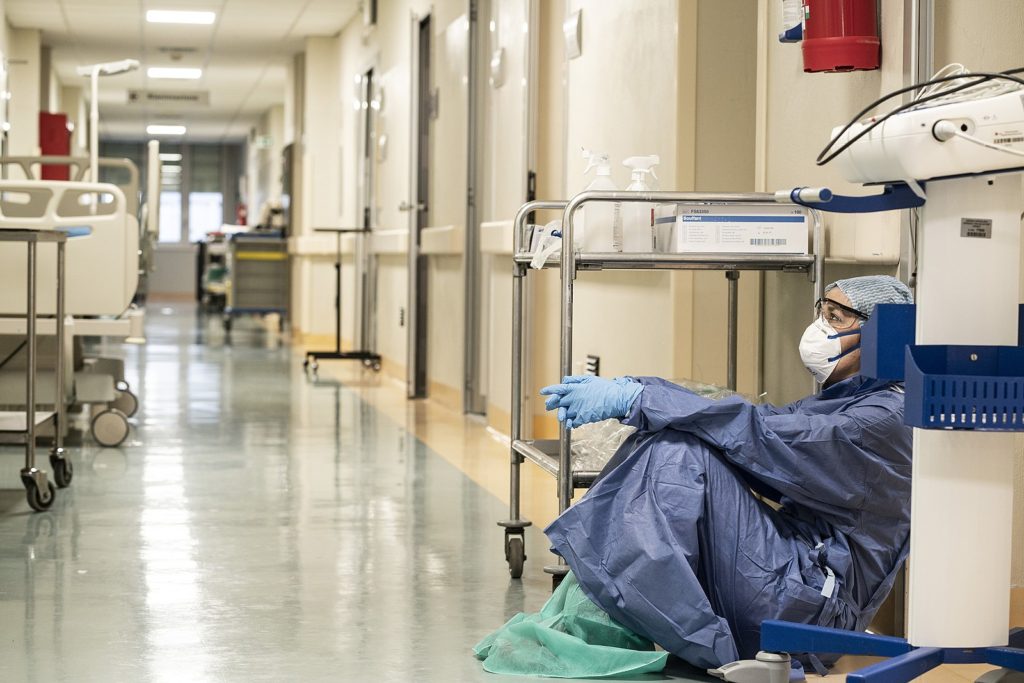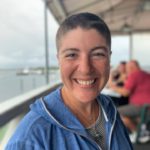This piece, “Hold on Tightly, Let Go Lightly” by Amelia Parenteau, was originally published on HowlRound Theatre Commons on November 24, 2020.
Pursuing a life in theatre or medicine requires such dedication that it can be hard to imagine a career transition, and yet, as this year has viscerally reminded us, the only constant in life is change. Although the path between theatre and medicine may not be evident at first glance, the specific skill set that both professions require makes the transition more seamless than one might imagine. At a time when many people are considering the best way forward, I spoke with ten individuals who have professional experience in the fields of both theatre and medicine—healing body and soul, mind and spirit—about how they’ve navigated their career transitions and how changing their professional identity has affected their outlook on the world. Given this year’s national discourse around who qualifies as an “essential” worker, let’s examine the essential nature of both artists and medical workers, whose functions in a sick society, as my interviewees testified, have more in common than perhaps meets the eye.
It’s not shocking that performers and medical workers might gravitate towards each other’s careers, given the particular demands of both professions. Both are rife with burnout, populated by ambitious, driven people willing to put in the work and make personal sacrifices for the sake of careers in fields that even anticipate their workers’ inability to maintain such a hectic pace. Seta Bairamian, who is in the process of transitioning from an actor/dancer/arts administrator to registered nurse, speaks poignantly of “compassion fatigue,” saying the phrase implies compassion is the problem, as a prelude to burnout. “My compassion is not the problem, it’s my biggest asset in [the medical] field!” Bairamian insists. “Your gifts are not able to survive in that system.” She remembers feeling the same frustration working in theatre, describing the present structures of both industries as “unsustainable.”

And yet, Bairamian, like all those interviewed for this piece, has traded one structurally flawed but well-intentioned system for another, moving from theatre to medicine and repurposing her hard-won skills. Those with the privilege of being able to seek happiness and/or fulfillment through a career change are expressing a manifestation of their personal evolution, and the resulting shift in professional priorities and desires. Yet leaving these particular fields is stigmatized, so much so that the fear of being judged for giving up on your dreams, or wasting talents you’ve worked hard to cultivate, can be crippling. Kent Haina, a former dancer/actor/singer and current Certified Registered Nurse Anesthetist (CRNA), says, “When you’re an actor, it’s everything. You are the product in a more personal way than anything else.”
So, why risk the change? Many people I spoke to told a familiar story of approaching or reaching their milestone thirtieth birthday and reevaluating the trajectory of their lives, understanding the indefatigable energy of their youth might wane, but the pressures, demands, and sacrifices of their industry would remain the same. Some individuals described a desire for more stability and/or more money, acknowledging that even when one “makes it” in the performing arts, it’s difficult to attain a certain lifestyle. The flexibility required to make a creative career work—trying to juggle numerous projects, jobs, and commitments in an ever-shifting landscape of priorities—can lead to burnout.
That said, learning to hustle has translated into an advantage for those transitioning into the medical field. Everyone I spoke to who was on this path was already used to long hours, snap decisions, and, to paraphrase Anne Bogart, holding on tightly and letting go lightly. Andrew Keltz, a former actor currently completing his speech language pathologist clinical fellowship, says, “I’m not throwing out all the stuff that has made me me, that identity of being an artist. I’m just expanding on it.” Annalize Sussman, an opera singer in the same speech language pathology fellowship program as Keltz, says she is constantly trying to “walk through the discomfort” of foraying into the unknown, as that’s where the most rich learning opportunities come from.
Keltz offered a beautiful metaphor that his friend shared with him when he was struggling with his career transition and the resulting identity shift. She told him to think of his life as a night sky chock-a-block full of stars and imagine his current career path as a singular constellation within it. Then to dim those stars, look again, and try to form a new constellation. Not only is it up to each individual to draw the constellation of their lives, it’s easy to get stuck on the familiar story, connecting the stars that have always been credited with forming our identity. But there is room for multiplicity within! So many of the individuals I interviewed expressed a desire for society to shed the binary of art/science, left brain/right brain, either/or. In fact, it is much more honest to create a life story that encompasses our grey area, our fluidity between creative and professional outlets.
I’m not throwing out all the stuff that has made me me, that identity of being an artist. I’m just expanding on it.
Andrew Keltz
For example, even though Orlando Rivera had decided his nursing days were officially over when he was accepted into Juilliard’s acting program in 2018, when the pandemic struck, he returned to the front lines. Having been an ICU nurse for ten years, there was no way he was not going to be around for this moment. “This experience really humbled me to never put ultimatums on anything in life,” he says. “It’s always open now, at this point, for me.” Both Rivera and Roy Vongtama, two medical workers who discovered their passion and talent for acting later in life, have found ways to cultivate their talents in both fields simultaneously. Vongtama says the discipline and determination that have made him a successful doctor are also huge assets when it comes to preparing for theatrical roles. Rivera and Vongtama’s medical backgrounds not only offer a rich well of real-life experience to draw from, but also allow them to bring a healthy level of perspective to their work. Rivera says, “One is life-and-death stakes, one is simulated life-and-death stakes. But even in simulated life-and-death stakes, it has to be real life and death or people won’t respond to it in their body.” That commitment and passion is essential to success, whether in an operating theatre or a black box.
Moving in the opposite direction, all the performers-turned-medical workers I spoke to have also found ways to continue their art practice in their new lives. Sussman says, “My singing opened up in this whole new way after I switched directions. Once I knew I didn’t have to sing, I was relieved of so much pressure and I loved it again.” This fluidity is possible—at this point even seems probable, given the simultaneous crises that are currently affecting many parts of peoples’ lives that had been taken for granted—and narratives of quitting one profession cold turkey for another quickly become reductive. As citizens and creative professionals, we have an unprecedented opportunity to take stock of how we are using our gifts and prioritize the healing of our communities over stymieing ourselves with outdated notions of change indicating failure.
This notion of service to community ran through all the interviewees’ narratives of what drew them from one field to the other. As playwright, actor, and drama therapist Jessica Litwak says, “The pursuit of healing for communities and individuals is central to my work. I work towards the notion of usefulness in my theatre practice, and consistently ask: How can we make this great art of good service?” As for Vongtama, he sees everything he does as serving. “Whatever comes to me is what I’m supposed to be doing,” he says. “The mind gets very ‘this or that,’ but I call it the beauty of ‘and.’” It’s a classic liberal arts, humanist argument: we all have the potential for a well-rounded education and thereby perspective on and function in society. In the theatre world, Chekhov is a classic example of this particular double threat as a lifelong playwright and practicing medical doctor, and Ken Jeong is perhaps the most prominent current example of a doctor turned actor—he didn’t give up his medical practice until after filming Knocked Up.
As citizens and creative professionals, we have an unprecedented opportunity to take stock of how we are using our gifts and prioritize the healing of our communities over stymieing ourselves with outdated notions of change indicating failure.
Other major similarities between the two professions cited by the people I spoke to include presence (listening, observing body language and/or environment, working with one’s hands); communication (facilitating narratives, storytelling as patient advocacy, honesty); collaboration (community building, creating trust); creativity (being able to think on your feet, comfort with ambiguity); empathy (generosity); composure (staying cool under pressure, familiarity with high stakes environments, being able to take criticism); and intelligence (curiosity, dedication, discipline). There was consensus across the board that one’s previous life experience enriches and informs the new work. Pivoting in both directions allowed for new insight into just how versatile theatre artists’ skill sets are.
Complicating how we choose to implement our skills is the encouragement from our capitalist society to monetize creative outlets; the business of art has grave potential to grind the joy right out of creative work. (When Dr. Adam Rubin, an actor/singer turned laryngologist, speaks to performers considering professionally pursuing their art, he says, tongue-in-cheek, “In general, if there’s anything else that you love doing, you should think long and hard about doing it.”) Conversely, in choosing not to pursue creative talents professionally, the capitalist world would have us believe we are invalidating our abilities; if only we would try to pursue our art professionally, then we might have a chance at mainstream success. It’s truly a catch-22 of validity, identity, and happiness, and it’s no wonder so many young adults, when taking those first strides towards adulthood and independence, don’t find a straight line from natural abilities to professional fulfillment.

In the throes of this pandemic, many workers are being asked to adapt their relationship to their industry as they transition to remote work, the realities of un- or under-employment, working the “front lines” at a previously lower stakes job, or, most fundamentally, the reality that their profession may never function in the same way again. In the midst of changing attitudes, the idea of “essential” work has been brought to light in a prominent way. All those interviewed agreed that theatre work is essential, although not in the same terms as we are now describing “essential” in the midst of the pandemic. Haina points to Maslow’s hierarchy of needs to draw a distinction between our basic needs (for survival) and our psychological and self-fulfillment needs (for well-being): while first responders are protecting our ability to keep living, theatre workers have the potential to help us thrive. David Feldshuh, an actor, director, and emergency room doctor, says there is the dawning recognition in light of the pandemic that the people who are “essential” to our lives may not be those with the most influence or prestige, and America needs more of that line of thinking. “There are many people who take pride in their work,” Feldshuh says, “and they deserve more recognition and, frankly, more compensation.”
Several current medical professionals expressed frustration about community members showing support for essential workers in trendy, visible ways (with lawn signs, pot banging, social media posts, etc.), but then endangering the community in other ways (by breaking quarantine, not wearing a mask, etc.). Bairamian says, “True gratitude looks like calling your representatives, asking why healthcare workers still don’t have the equipment they need to do the work safely.” With case numbers climbing daily as we head into the third wave of the pandemic, it is time to dig deep to help our communities not only survive, but thrive. Given our storytelling trade, theatremakers in particular have an opportunity to amplify voices from the front lines of the medical community and rally support.
As we all reevaluate our relationship to our work and society at large, perhaps taking a more holistic view of our capabilities and capacity to help others is the most important first step. Service is the driving force behind all these medical and theatre professionals’ careers, and we would all be well served to follow their example.
To learn more about The Civilians and to access exclusive discounts to shows, join our email list at TheCivilians.org.
Author
-

Amelia Parenteau is a writer, French-English translator, and theater maker with a passion for social justice, based in New Orleans. An alumna of Sarah Lawrence College, she has worked with Ping Chong + Company, The Civilians, the French Institute Alliance Française (FIAF), The Lark, the New York International Fringe Festival, the Park Avenue Armory, and Theatre Communications Group in New York City, as well as Trinity Repertory Company in Providence, RI, People's Light in Malvern, PA, the Eugene O'Neill Theater Center in Waterford, CT, the Théâtre du Soleil in Paris, France, and Intramural Theater and No Dream Deferred in New Orleans, LA. Her writing has been published in numerous publications including American Theatre Magazine, Contemporary Theatre Review, and HowlRound. www.amelia-parenteau.com
View all posts









